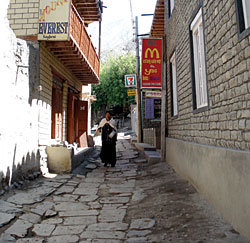 RABI THAPA |
Judging by the persistent lines outside the KFC/Pizza Hut complex in Darbar Marg, a full week after its pompous opening, customers are in for a special culinary treat, the likes of which has never been experienced in Nepal before. I can imagine that when McDonald's decides to usurp YacDonalds in Kagbeni (right), Thakalis and Manangis from across the Kaligandaki Valley will throng the narrow alleys of that village day in day out, braving sub-zero temperatures and snow blizzards and GLOFs. Now the word on the street is Budweiser, the self-proclaimed King of Beers, will soon be available in the Nepali market.
But the truth is, KFC does not fry up anything close to the best chicken and chips in the world ('Nobody does chicken like KFC'), nor does Pizza Hut manufacture anything that honours the pizza's proud Italian ancestry ('Now You're Eating!'). Any of the innumerable roadside tandoori joints in Nepal will best the Colonel's oil-drenched, bland, soft-boned offerings. And Pizza Hut is to pizza what Budweiser is to beer. The prospect of this last abomination has me frothing at the mouth. Practically the whole of Asia doesn't know how to make a decent beer. Now we are supposed to feel grateful that this insipid, piss-weak approximation of a lager (yes, that's you, buddy) will soon be served as a premium beverage to those who take for granted the apologetic slogans of another great pretender, Carlsberg - probably the best beer in the world.
I don't care if opening a thousand franchises of all of the above boosts the economy or creates jobs or helps us conclude the peace process. I'm not proposing we go bomb these places, or even boycott their products. But please, marketers incorporated, don't go pretending that any of these franchises exist because of the quality of their products. It's more honest, in the civilised world at least, to trumpet their value for money. But why do we seem so fascinated by fast food in Nepal?
If cheapness is not necessarily a factor in Darbar Marg - considering that holding onto the franchise entails payments of 7 crore rupees ($1 million) a year - then is it the reliable uniformity of the products, something that will become apparent once the franchises expand? Is it the efficiency of fast food, especially given plummeting service standards across our nation's restaurants? Or is it even the calorific lure of conventional, cholesterol fast food?
I'm not convinced these, or other explanations conventionally offered to explain the inexorable rise of fast food franchises, yet apply straightforwardly in Nepal. If they did, why would prosperous Nepalis visiting London or New York express a preference for, nay, insist on fast food?
Perhaps it's simply the allure of the west, an undiscriminating appreciation of everything foreign (that is unthreatening to one's values or practices), one that conflates pizza with Pizza Hut, burgers with McDonald's, fried chicken with KFC. A misconception that these low-grade franchises are indeed the pinnacle of western civilisation. Or maybe it really is something more fundamental - the discovery of the taste of fast food, in all its gory, primitive glory.
A Korean housemate of mine in England received, every three months, three square feet of home from his mother. Open sesame, and there'd be packs of cutely over-packaged Korean snacks, sweet, sour, hot, plugging the gaps between canisters of preserved foods. Fiery kimchii, scrumptious shrimps, fried fish, creations I could only dream of within the bland bounds of blighty. But what did this scion of a proud culinary tradition do while these delicacies did time at the back of the fridge? He'd boil up a frankfurter, trap it within two slices of white bread, and splurt half a bottle of ketchup onto it.
Perhaps good food is more than some can take, at least all of the time. And perhaps fast food, far from representing an unnatural devolution from the ideal of hunting and gathering all the ingredients necessary for a considered, respectful and respectable slow food experience, is actually, equally, a tribute to our roots as rather baser creatures, happy with primary colours and tastes, simpler times and tunes. If only the marketers were as honest as their customers.
READ ALSO:
Our cup runneth over, Rabi Thapa - FROM ISSUE #471 (09 OCT 2009 - 15 OCT 2009)
Authenticity rules, Rabi Thapa - FROM ISSUE #469 (18 SEPT 2009 - 24 SEPT 2009)



